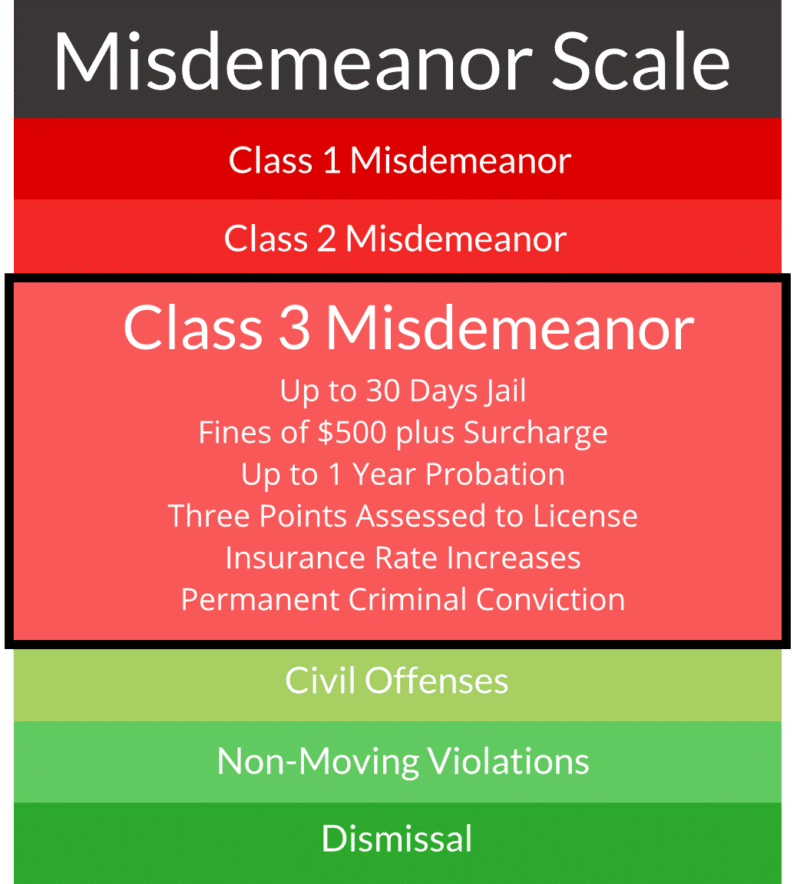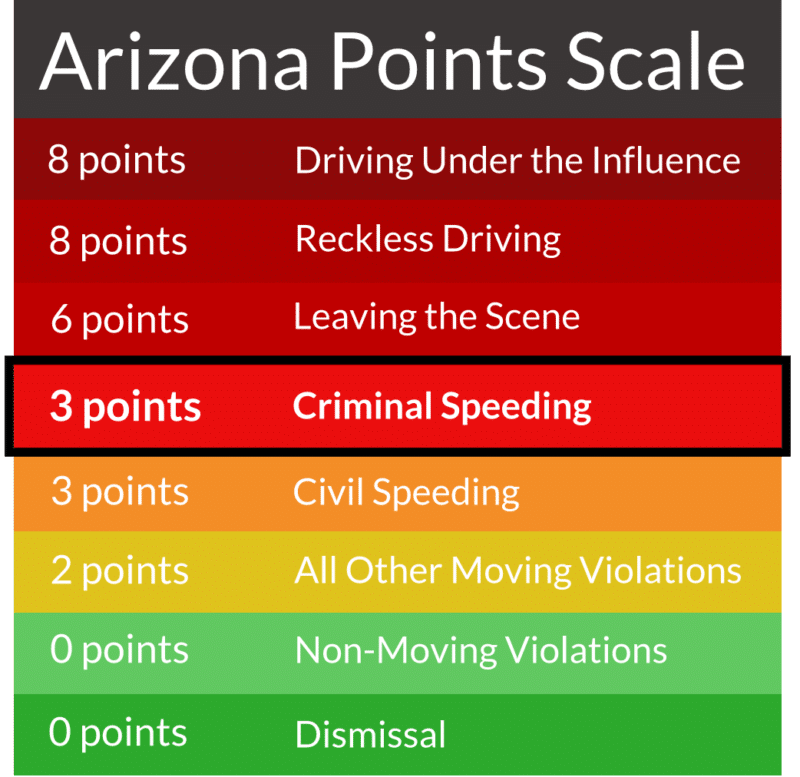Criminal Speeding
What is criminal speeding in Arizona?
Criminal speeding in Arizona is a Class 3 misdemeanor that categorizes a speeding violation as a criminal offense (Arizona Revised Statutes 28-701.02).
Is Criminal Speeding is a Misdemeanor?
The chart below illustrates where criminal or excessive speed falls on the scale of violations and criminal offenses in Arizona:

How can you get a criminal speeding ticket in Arizona?
There are three ways to get a criminal speeding ticket in Arizona, all explained below.
Excessive Speed (28-701.02a3)
This is the most common type of criminal speeding offense. This offense does not depend upon the posted speed limit. Exceeding the posted speed limit by more than twenty miles per hour in any location constitutes a violation of this section.
This type of charge is very common for those traveling in the more rural parts of Arizona, often traveling between major tourist destinations such as the Grand Canyon, Sedona, and Flagstaff.
Exceed the posted speed limit in a business or residential district by more than twenty miles per hour, or if no speed limit is posted, exceed forty-five miles per hour. (28-701.02a2)
This is another common type of offense and is usually seen in more urban parts of Arizona in the major cities. This violation occurs if a person exceeds the posted speed limit in a business or residential district by more than twenty miles per hour, or if no speed limit is posted, exceeds forty-five miles per hour. Some examples include:
- Traveling 56 miles per hour or above in a 35 mile per hour zone
- Traveling 66 miles per hour or above in a 45 mile per hour zone
- Traveling 76 miles per hour or above in a 55 mile per hour zone
Exceeding 35 miles per hour near a school zone (28-701.02a1)
This is the least common type of criminal speeding offense, but occurs in more populated areas around school zones.
This violation must occur in a designated school zone, which generally includes having signs posted.
Many people are shocked to learn that this infraction is in fact a jailable offense!
Contact
"*" indicates required fields
What are the penalties for criminal speeding?
Technically, under the law, a conviction for criminal speeding is punishable by:
- Up to 30 days of jail
- A fine of up to $500 plus surcharges
- Up to 1 year of probation.
Practically speaking, other consequences can be severe, including:
- Adding 3 points to your license
- Disqualification from job opportunities
- Impacts on immigration status
- Non-renewal of Visa or temporary work status
- Impacts on insurance rates
- Driver’s license suspension
- Disqualification of commercial driver’s license status (CDL)
- Loss of professional licenses
- Loss of security clearances
- Loss of government advancement opportunities due to insurance costs
- Reputation damage-having to check the box “criminal conviction” on any application materials
Many people are shocked that Arizona has a law that imposes criminal penalties on speeding violations.
Many other states do not have these types of laws, but Arizona reports all motor vehicle violations, including criminal speeding, to out-of-state Motor Vehicle Departments and Department of Motor Vehicles.
Despite these significant penalties, there are options, defenses and a robust strategy we have developed to assist you through this charge.
How many points is criminal speeding?
Criminal speeding in Arizona is a 3 point violation. Arizona licensing operates on a system that adds points, rather than subtracts them. When you reach 8 points or above, you will have problems with the Arizona motor vehicle department. Here is where criminal speeding falls on the scale in Arizona:

Both criminal speeding and civil speeding violations are 3 point violations, but they are reported to the motor vehicle department based upon the violation code.
In Arizona, the motor vehicle department reports all violations out of state so they are likely to transfer to your home state if you are not an Arizona resident.
For more information on points in Arizona, how to check how many points you currently have, and what we do to help people in those situations, please visit this page: License Suspensions & Points in Arizona.
I just received a criminal speeding ticket, what are my options?
Being stopped by the police or getting written a ticket is not a fun experience.
Officers are often rude and the encounter is often heated and tense.
When you are charged with criminal speeding, you have a few options:
- Plead guilty as charged
- Represent yourself throughout the process
- Hire an attorney to represent you
Regardless of which option you choose, you (or your lawyer) cannot miss your first court date.
Two important pieces of information that you must remember: (1) the name of the court and (2) your next court date.
Here is an example of where this information is located:

It is important that you do not forget this information. Either you, or your attorney if you choose to hire one, will need to appear in Court to attend this court date.
What is the court process for criminal speeding tickets?
It is important to remember that because this is a criminal violation, the court process is the same as with any other crime.
The process can be surprisingly long and confusing for those that are not familiar with the criminal system.
The chart below details the general process in a criminal speeding case.
Please keep in mind this chart is for illustrative purposes only and case developments are unique to every case.

Arraignment
This first court date on your citation is called an Arraignment.
It is a very basic, preliminary hearing that is generally only held in these types of cases for people who do not have lawyers.
At this hearing, your rights are explained as well as the maximum penalties you face under Arizona, as explained above.
Just because the maximum penalty is 30 days in jail does not mean that this is what the actual result will be at the disposition of the case. However, the Judge at this hearing has to make sure you understand the nature of the charge against you.
At this hearing, if you choose to plead guilty, you may do so.
If you do, you will have a criminal conviction, 3 points on your license, and a blemish that follows you throughout life. Most people choose not to do this.
Instead, you may enter a plea of not guilty. This is what we do, as your lawyer, from the beginning of the case. We contact the court to let them know that you have retained our office and we enter a plea of not guilty on your behalf.
After entering the plea of not guilty, the court will vacate the arraignment in your case and reschedule a new court date in about 30 days.
This is where the meat of your defense begins.
Pre-Trial Conference
A pre-trial conference is the first, second and sometimes third court date scheduled after your arraignment.
It is a standard informal meeting between our office and the prosecutor.
Normally, plea offers and other conversations occur at these meetings.
We often talk about disclosure issues, problems with reports or evidence, and mitigation information.
The majority of the work completed in your defense occurs in between these settings.
These are scheduled so the court can stay apprised of developments or issues as they occur.
Discovery Phases
In between court dates and pre-trial conferences, our office and the prosecutor’s office exchange what is known as “discovery.”
In criminal speeding cases, this can often include:
- Certification cards
- Training certificates
- Calibration records
- Dash cam video
- Audio recording
- Body camera footage
- GPS Data
- AVL or “automatic vehicle location” data
- Traffic pattern studies
- Maintenance logs
- Work orders
- Disciplinary history
At times, this evidence is not available or does not exist.
We can use that to our advantage.
Other times, we have to fight to obtain this information as law enforcement agencies or prosecutor officers refuse to provide them to aid in your defense.
Many people often think that because this is a “speeding ticket” that they do not need a lawyer without realizing some important aspects of the law.
Because criminal speeding is a misdemeanor, the rules of criminal procedure, constitutional law and due process all apply as in any other criminal case.
A criminal speeding case progresses alongside cases of assault, domestic violation, DUI and other crimes and the same rules apply.
Your case will be assigned to a prosecutor who will represent the officer who wrote the ticket and whose job is to convict you.
Although this may be scary and worrisome at first, it gives our efforts to defend you specific advantages not available in civil cases.
Our defense is separated down to two main avenues, legal and personal:

There are two main areas that our office investigates in criminal speeding matters; legal and mitigation.
We conduct a thorough legal review of your case to ensure the state has enough evidence to meet their burden.
As criminal cases progress, we engage in a thorough discovery review of all materials that the state has, or should have, in your file.
It does not matter whether your number is 86, 106 or 126. There needs to be be a proper foundation for this number.
They cannot simply make this number up out of thin air.
Many times, the state simply does not have enough evidence to support a conviction.
Most people who contact our office to help them through a criminal speeding ticket have never been in trouble before or have no criminal record.
If there are 10 people who have been charged with criminal speeding, how do we make you stand out from the crowd?

We work with you to gather information about you, your life, and your unique circumstances.
As your case progresses, we help guide you to gather information that we believe will be helpful in your case.
We want to humanize your situation, and show that you are much more than a name and a case number.
We present this information to the prosecutor, to the court, and at times the officer involved.
This allows us to work on negotiating a resolution that serves the interests of all involved.
We often get the question, “what if I just plead guilty – can I expunge my record later?”
Arizona is one of only a few states that doesn’t have an existing process to seal records or expunge offenses. When combined with the fact that Arizona is also an Open Records state, most criminal offenses will be visible on your record for any background check service or person to see.
What Arizona does have is the Set-Aside process. While this doesn’t seal the record of or expunge the offense, it does serve as an official designation that you have completed all the terms of your previous sentence; essentially, that you have paid your “debt to society” and have taken steps to move on with your life.
This is a very common and normal question to ask.
We have represented people like you all over Arizona in almost every court, at every speed, in every situation.
Each court, prosecutor, speed, location, officer, mitigation and special circumstances will impact your outcome.
We have successfully resolved cases through:
- Not guilty verdicts at trial
- Pre-trial motions to dismiss granted
- Voluntary dismissal from prosecutor/state
- Motion to suppress / exclude granted and voluntary dismissal
- Dismissal with Defensive Driving School
- Dismissal with LifeSkills
- Dismissal with Wise Choice Alternatives
- Negotiated reductions to civil offense
- Negotiated to community service
- Negotiated to non-moving violations
- Negotiated to deferred prosecution
The big question is: what about my case?
Contact our office for a completely free case evaluation where we will review your case with you and discuss your best options moving forward.
I received a criminal speeding ticket and I need help.
That is why we are here. Call our office today at 602-497-3088 or submit your question and case information using the form on this page. Our team offers free, no obligation case evaluations and we hope to answer your questions soon. Contact our team today!

